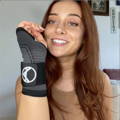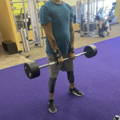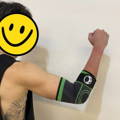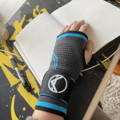
39 Questions and Answers About Knee Sleeves
june 27, 2023 | 4 Mins Read
TABLE OF CONTENTS
Thinking about getting knee sleeves to improve your workouts or provide support for your knees? It's important to ask the right questions to ensure you make an informed decision.
Knee sleeves have gained popularity among athletes and individuals seeking joint support, but what exactly are they? Knee sleeves are compression garments designed to provide stability, compression therapy, and warmth to the knee joint. They are commonly used in sports like weightlifting, powerlifting, running, and various other activities that involve repetitive knee movements.
Don't miss out on expert insights and practical advice about the most important considerations when shopping for knee sleeves. But these questions are just the tip of the iceberg when it comes to knee sleeves. Whether you're a beginner exploring the world of knee sleeves or an experienced user looking for more advanced insights, this article will be your go-to reference for all things knee sleeves.

Absolutely! Knee sleeves are allowed in raw powerlifting competitions. The rule states that you can wear knee sleeves as long as they are elasticized and don't exceed 8 inches (20 centimeters) in length. However, combining a knee wrap with a knee sleeve is strictly prohibited.
Both knee wraps and knee sleeves are popular choices for athletes and individuals seeking knee support during physical activities. For your reference, we created a comprehensive comparison of knee wraps vs sleeves.

Well, it's best not to. Covering an open wound with a knee sleeve could introduce bacteria and delay the healing process. If you've got an open wound, proper wound care is a priority before you think about sliding on that knee sleeve.
It depends. Each person and surgery is unique, so your doctor or physical therapist will have the final say. While knee sleeves can provide support and compression that aids in healing, your new knee might have specific needs that a sleeve won't meet. So, before strapping one on, check with your medical professional.
The only time a knee sleeve might cause nerve damage is if it's too tight. If you're feeling numbness, tingling, or extreme discomfort, it's a sign that your knee sleeve might be cutting off circulation. Make sure to get the right size and fit – your knee sleeve should feel like a supportive friend, not a python!
While knee sleeves can offer some level of protection and support, they're not superhero capes that can prevent all knee injuries, including dislocations. The forces involved in causing a knee dislocation are typically much greater than what a knee sleeve can counteract.
Always listen to your body, and remember – correct technique and form are your main lines of defense against injuries.
Yes, knee sleeves can be part of your comeback story! They provide support and compression, which can help with swelling and pain. But remember, they're just one piece of the puzzle.
Most ACL tears do not heal on their own, and treatment often involves roper rest, physical therapy, and potentially even surgery, especially for those looking to maintain an active lifestyle. This is typically followed by a comprehensive physical therapy program to restore strength and function to the knee.
Generally, no. Knee sleeves are designed to support, not hinder. However, If you rely too heavily on knee sleeves for support during physical activity, it could potentially lead to weakening of the knee joint's natural stabilizers, such as the quadriceps and hamstrings.
This can happen because the body may get accustomed to the external support and could potentially 'offload' some of the work that would otherwise be done by these muscles. This can lead to a relative imbalance between the strength of the muscles and the demand placed upon them during activities without the knee sleeves.
It's all about balance – strengthen your muscles and use the sleeves for added support.
Yes, we recommend wearing knee sleeves that are metal-free. Once on the flight, make use of the legroom you have as much as possible. Try to flex and move your joints regularly to prevent stiffness. If you have exercises that can be done while seated, such as flexing your ankles or doing leg lifts, a long flight is a great time to do these. Especially during a lengthy flight, it's crucial to get up, stretch your legs and walk around the cabin when it'ssafe to do so.
Here's the thing - knee sleeves are great, but they're not miracle workers. They can provide support and help manage pain, but they're not designed to treat serious injuries like kneecap fractures. This kind of fracture usually causes intense pain, swelling, and difficulty in straightening the knee or walking. The knee sleeve might help with the swelling to some extent, but it won't immobilize the joint, which is necessary for healing.
Treatment of patellar fractures usually requires immobilization using a cast or splint to keep the knee from moving. In many cases, surgical intervention might be needed, especially if the patella is shattered or if the fractured pieces have moved out of place.
Bone-on-bone knee pain typically refers to the pain that results from osteoarthritis, a condition where the cartilage in the knee joint gradually wears down. When this cartilage, which serves as a protective cushion between bones, wears down completely, the bones may rub against each other causing pain and discomfort - hence the term 'bone-on-bone'.
Knee sleeves provide some support and compression to the knee joint, and they can help reduce swelling and inflammation. This, in turn, can alleviate some of the discomfort. However, they are not a cure for the underlying problem. Knee sleeves cannot regenerate the lost cartilage or reverse the damage caused by osteoarthritis.
The primary role of knee sleeves in the context of osteoarthritis would be to aid in symptom management. They may allow for greater comfort during physical activities, reducing pain and stiffness associated with movement.
Absolutely! When you're climbing those stairs, your knees are doing a lot of work. Knee sleeves can provide extra support, helping to reduce strain on your knee joints. Think of them as your personal stair-master, there to support you with each step you take.
Knee sleeves can help manage some of the discomfort that comes with added weight. They provide extra support and can lessen strain on your knee joints. However, they're a part of the solution, not the whole answer. If weight gain is causing knee pain, you might want to explore a comprehensive approach that includes diet, exercise, and perhaps consultation with a healthcare professional.
The compression and support from knee sleeves can help manage symptoms of patellar tendonitis. Wearing knee sleeves for patellar tendonitis can help reduce inflammation and improve blood flow, which aids in recovery.
Just remember that while they can provide relief, they're not a substitute for proper medical advice from a healthcare professional.
Learn more about the practical ways to easing the pain associated with patellar tendonitis.
Yes, they can aid in recovery! Knee sleeves gives pressure to your muscles and joints, which helps reduce inflammation and aids in the recovery process. When used correctly, they can also provide extra support during exercise to help prevent injury. Keep in mind that proper warm-up and cool-down are also important for effective recovery.
Knee sleeves can provide some support and prevent minor overextensions. However, if you're prone to hyperextension, you may benefit from a knee brace specifically designed for this issue, which offers more robust support.
Wearing knee sleeves can be preventive, especially if you are involved in activities that put a lot of stress on the knees. Knee sleeves help in maintaining good knee joint alignment and stability during movements, potentially reducing the risk of injury.
Plus, they give you better proprioception – which is basically your body's ability to sense its own position and movement – so you can perform more safely and efficiently.






Author

Claire Evans worked as the content marketing manager at Koprez. Claire combined a background of writing and editing, marketing, and patient education to best serve consumers, fitness enthusiasts, athletes, and anyone who relies on the Koprez brand for helpful information.
Koprez® Featured Products


"I sprain my wrist super often, so I decided to try out this sleeve. This is game-changing! I've been using it for a while now, and my wrists feel amazing. I haven't gotten in any injuries since using it too. It just makes my wrists feel so supported."
Alexis A.


"Use this for my boxing training. It is a very comfortable brace and does not move out of position during skipping ropes and sparring sessions. I use it while running too. Probably the best brace I've purchased throughout the years. It is very flexible. Makes me look like a pro! :)"
Samuel L.


"I've just got back to running after a couple of years of being plagued by injury. These compressions socks are helping give me peace of mind while I build up my distance again. They are the perfect level of compression, super comfy, and very high quality. Feel great while on a run, and looks great in the orange colour I have!"
Dave R.


"I have a weak ankle, and the Koprez ankle sleeve has been a lifesaver. Wear it every day. Super breathable and comfortable. Like wearing a cool sporty looking sock!"
James F.


"This is the best knee sleeve I've ever tried. It's now a must-have for all my exercises. A few years ago, I had an accident that damaged my knees, but with Koprez I can be active again with no knee pains at all. It's been truly amazing!"
Alex M.


"One of the best purchases I've ever made. It fits your legs all the way from top to bottom, great snug fit, gives you support and definitely helps during rehab and training."
Rafael A.


"I had a minor elbow injury, and Koprez sleeve was super supportive and definitely helped me recover faster. I still use the sleeve to prevent further injury. So far, so good. Very comfortable and does not feel hot at all. Highly recommend!"
Corey B.


"It's really been a game-changer for me. It allows me to exercise a lot longer than I used to. Now my knees don't hurt, and they're not uncomfortable at all."
Mike P.


"Great product!!"
Harold


"I have carpal tunnel, and this brace has helped me work pain-free. Love the materials, and I can feel my wrists slowly getting better, even when I don't wear them!"
Christopher J.


"I wanted to try out these sleeves to improve my squats and deadlift in the gym without worrying about injuring my knees. They stayed up throughout the entire gym session, and my knees feel super supported. Now I can do what I love for years to come. "
Corbin C.